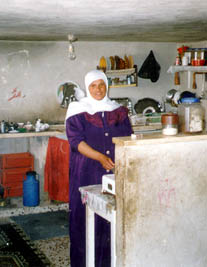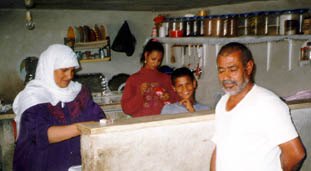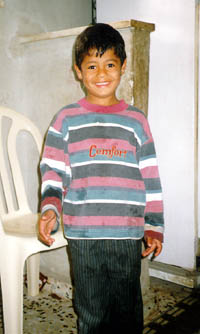





PERSONAL STORIES
Ra'id loved life. Despite his young age, he was one of the most well known of the 25,000 residents of Jalazon refugee camp. Known as "'Abdo" to the camp's residents he lived life according to the philosophy of "Living every day to its full, living happily and having fun." A close friend said, "No stories I can tell can describe his life better than the fact that when he died he left a huge gap in the camp. When an amusing incident occurs, people still smile and say, "'Abdo used to do that!" 'Abdo was generous-spirited. People who knew him tell stories of how he would wait for taxis to arrive at Jalazon from Ramallah. When he saw old women getting out of the taxis he would quickly offer to take their bags of shopping and walk with them to the other end of the camp. He did this for no other reason than a simple desire to help. He was well-known as a friend to those who were blind or paralysed. 'Abdo left school when he was 12 to work. He hated school despite being well-liked by his teachers and friends. After finding a few odd jobs he started work pushing a cart in the Ramallah vegetable market. There he earnt 50-60 shekels a day. His father said: " I tried to convince 'Abdo to go back to school and get an education. I tried to tell him he should study to become a lawyer or doctor. But he wouldn't listen. He would only say, 'I don't like school or study. I want to work even if it is dirty work. I want to keep turning stones until we get rid of the occupation, this is the way I see my life.'" Every day after work 'Abdo would give his father 20 shekels, telling him that this was all he earnt. Then he would then give his mother 30 shekels and his sister 5 or 10 shekels. If his mother protested he would laugh and explain "My father only needs money for his cigarettes! You need money for food, clothes and the family!" His mother remembered that he would bring her a packet of chewing gum as a gift, every single day. His sister saved every shekel 'Abdo gave her to buy a gold necklace and rings. He would often buy her and his brothers little presents he saw in the shops of Ramallah. Before becoming an invalid, 'Abdo's father worked as a guard in a Ramallah car yard. He fondly remembered 'Abdo turning up at work at lunch time with liver sandwiches and juice. "Because of our economic situation such foods are considered an impossible luxury. Yet 'Abdo would buy these things from the money he earnt at work." His father also remembered 'Abdo turning up at the car yard, taking the keys of some of the cars. "He would get in, turn on the radio and start dancing to the music. He loved to have fun."
"He who helps others, wins"
Ra'id Ibrahim Sharakeh, "'Abdo", aged 15, Jalazon Refugee Camp, Ramallah.

Right: 'Abdo's younger brother Nadir, currently in prison. Only one photo exists of 'Abdo himself and was unavailable.

Right: 'Abdo's mother, in the kitchen of their house in Jalazon Refugee Camp. The word "Ra'id" can be seen written on the wall behind her.

Above: Abdo's family in the kichen,
his father standing on the right.
Memories of that fun-loving and mischevious spirit are what have stayed with 'Abdo's friends. "One day at school," a close friend said "'Abdo put some kittens in a box and hid them in the teacher's desk. When the teacher opened his drawers he nearly fell off his chair to the delight of the class. The teacher was angry and demanded who was responsible. The class remained silent. Eventually he turned to 'Abdo and said 'It could only have been you 'Abdo!'. 'Abdo replied 'Me? I couldn't do such a thing! Ask the class!' The class remained silent and even the teacher began to laugh."
'Abdo had a great talent in impersonation and in making people laugh. He used to impersonate people from Jalazon as well as famous figures such as President Yasser Arafat. "Whenever there was a wedding or party 'Abdo would be asked to lead it." said one camp resident "He loved to dress up in masks and dance at the front of marches or on stage. Whenever people were going on trips to places such as Jericho you could be sure that they would not forget to invite 'Abdo along."Even little children remember 'Abdo. One young child recalls "'Abdo used to pick us up and throw us in the air and over his shoulders." His younger brothers say he used to tickle them every night before bed , "He wouldn't let us sleep without half an hour of laughing."

Right: 'Abdo's youngest brother, Abdullah.
Two months before his death 'Abdo began to study music. He loved it with a passion and planned to march in parades playing an instrument. After he was killed 'Abdo's youngest brother Abdullah took over his music studies.
Despite his fun-loving attitude 'Abdo had a serious side. Camp residents remember his maturity. When his father was unable to make social occasions such as weddings or funerals 'Abdo would stand in for him. Even when he was as young as 9 years old, 'Abdo would go and give greetings and respects from his father. He would offer his help bringing chairs, invitations and of course in the singing and dancing.

Right: 'Abdo's brother Abdullah, in the band, second from the left.
Even at times of conflict between his family and others 'Abdo would remain the bridge. His father recalls criticizing him once for helping a family with whom his family were having difficulty. 'Abdo replied, "This is life, it is not forever, you must help people. He who helps others, wins."
Like all Palestinians, 'Abdo felt the Israeli occupation on a daily basis. Friends report that he had a sense of invincibility when dealing with the Israeli soldiers. One day, aged 11 years, he was arrested for throwing stones and was sat down by a soldier near the side of the road. The soldier's helmet fell off and as he was trying to make radio contact with his base, 'Abdo grabbed the helmet and ran down the hill. He then put the helmet in the middle of the road and started to dance around it. The soldier could only look on helpless. Other soldiers started to laugh at the misfortune of the first.
On another occasion an Israeli soldier had taken a Palestinian flag and was cleaning his shoes with it and pretending to wipe his backside. He did this from the top of a hill in full view of Palestinians including 'Abdo. 'Abdo grabbed an Israeli flag and stretched it out in front of him. He slowly walked up the hill to the soldier and when he stood in front of him he tore it in two. He then turned and slowly walked down the hill. The soldier ran after him, grabbed him and rang the army base to come and take 'Abdo away. When the soldiers arrived 'Abdo started protesting "That soldier stole my T-Shirt!" They believed him and he was released.
Another time, while playing truant from school, 'Abdo approached a soldier and pointed at his gun. "What's that?" asked 'Abdo innocently." It's a gun to shoot you with," replied the soldier. 'Abdo then pointed at the ammunition magazine around the soldier's shoulder . "And what is that?" he asked. 'These are bullets to shoot you with" the soldier replied again. "Ah," said 'Abdo grinning, "I thought they were sardine cans!"
'Abdo was deeply affected by the death of another resident of Jalazon, his best friend Mohammed Al-Ramahe, two years ago, on 6 November 1995. Mohammed, nicknamed Al-Fir ("the little bird") and another friend, Mohammed Abu Sharefi, Shaboor ("Sooty") had been together with 'Abdo at a demonstration. Al-Fir was shot by Israeli soldiers in the heart and had bled all over the ground. 'Abdo had taken a rock covered in the his blood and placed it in his room. Shaboor hasn't hung around in the camp since then. He would only be seen every Thursday, when he and 'Abdo visited Al-Fir's grave in the Jalazon cemetery. 'Abdo was also to meet his death at the hands of Israeli soldiers.
While protesting near the Ma'aluffiyya checkpoint south of Ramallah on Wednesday 25 September 1996, 'Abdo was shot in the head with an internationally-banned dum-dum bullet. Half his head was blown away and he died instantly.
His mother was at the same demonstration but was unaware of her son's death until the end of the day. She was well known for being at every demonstration always prepared to help with the wounded or supplying water. The morning before the clashes began, she had visited Ramallah hospital and donated blood because she knew it would be needed.
When his death was discovered, it was announced in the camp that, "Ra'id had been killed." To begin with, everyone was confused, asking, "Who was this Ra'id? Do you know anyone called 'Ra'id'?", for to the residents of Jalazon, Ra'id will always be remembered as... "'Abdo".
Back to PERSONAL STORIES or on to the NEXT STORY